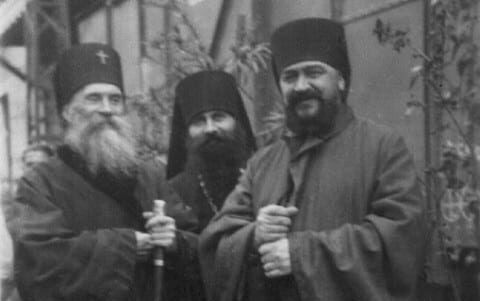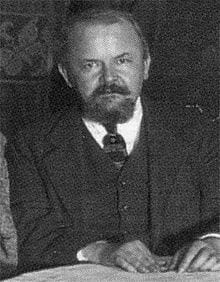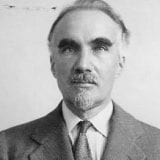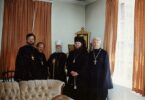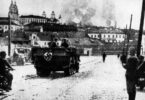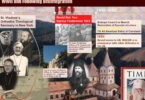These letters allow us to understand with more depth Metropolitan Anastassy (Gribanovsky), who was Primate of the Russian Orhodox Church Outside Russia from 1936 to 1964. With rare insightfulness they reveal an understanding of the processes, which had for many years determined the life of the Russian Church in and outside Russia. They were published in Vestnik RkhD (Le Messager), nos. 151 (1987) and 187 (2004) and translated by Priestmonk Alexis (Lisenko) with kind permission of the editors. Endnotes by Editor of ROCOR Studies.
Letters of Archbishop Anastassy (Gribanovsky) to G. N. Troubetskoy
1.
Apr. 10/23 [1925]
Much Esteemed Duke Grigorii Nikolaevich! Christ is Risen!
You, of course, will be greatly surprised if you find out that I have sent you my Paschal greeting from the environs of Chanaka-Kale, around which questions of war and peace were still circulating so recently. Part of my flock is here as well in the world of work squads hired by the British in this district, which they have fortified and closely guard. I have come to visit my dispersed sheep and help them organize their Church life.

Fr. Sergius Bulgakov
Father S. N. Bulgakov was to have left Constantinople today, after waiting for his son in vain. But his wife, too, has barely managed to recover from a foot ailment which kept them from leaving earlier. We had a long discussion about the future publication. While agreeing for a long time (not only on this point) on almost everything, we disagree only on the Catholic question. [1] At that point Bulgakov was interested in union with union with Roman Catholic Church. I find that discussing the unification of churches at this point in the sense and direction of V. S.. Soloviev is extremely dangerous (I touch upon the question of fact and not upon the question of principle, which likewise requires the most serious attention). This would result in arousing opposition both inside Russia and in the diaspora, where there is absolute unanimity regarding Catholicism as a known system of attitudes toward all of the rest of Christianity, and especially toward our own Orthodox world. Sergei Nikolaevich approaches this major issue from an academic viewpoint, but now is not the time and situation for us to be able to discuss this subject from abstract scholarly heights. It touches too closely upon the vital concerns of the moment, and simple prudence demands to stay away from it completely or approaching it, first of all, realistically. However, I do not think that the difficulties of this point could keep us from realizing the idea itself, which we have been cherishing so long. What inexhaustible wealth there is of other material, which is most poignant and vital, immensely important, and profound in its content! We are living amidst such an intense struggle of ideas and cultural currents that merely noting them means performing already a great service not only for the present generation but for future ones as well. Precisely because we find ourselves dispersed and coming in contact with almost the entire world that has been so deeply traumatized we can be eclectic in the best sense of the word and ascend to the summit of that universal Orthodoxy and true humanity, which Dostoevsky had foretold for Russia. As is known, contemporaries cannot comprehend the greatness of the events in which they participate. Take the latest appeal by the Archbishop of Canterbury, which was signed both by the Catholic archbishop in England and even by the Great Rabbi! Isn’t this a new historical meaning to our fearsome and also immensely interesting time, one of great traumas and great developments?
It would be sinful and shameful to bypass such phenomena in silence without shedding light on them and bringing them to the awareness of Russians, who are too dispirited by changing impressions and are thus inordinately indifferent toward them. Our forthcoming conference in Karlovac, at which I hope to meet with you, will, of course, facilitate the solution to this problem.
The one very sad thing is that the Karlovacans have been stigmatized and will acquire a permanent negative memory in history after the Holy Patriarch’s trial. [2] Political statements made at the council in Karlovci in 1921 were used by the Bolshevicks as a pretext to accuse Patriarch in disloyalty to the regime.
Forgive me for this and may the Risen Lord keep you! Do not blame me for responding to you so late – I hope to have more free time in the future and thus to be more punctual in my correspondence.
With my deep respect
Archbishop Ansastassy
I hope to return to Constantinople tomorrow.
2
May 24, 1925 Jerusalem
Most Esteemed Duke Grigorii Nikolaevich!
The approaching day of Pentecost brings my thoughts inevitably to Clamart, to your “skete-like” church, which has found its refuge under the protection of an age-old park. On this feast day your parish, dispersed among Paris suburbs, will gather there once again, and the Church will call upon the congregation the grace of the Holy Spirit, which is “like flaming tongues of fire,” as we called upon it in our conciliar prayer last year.
After the new great trial which had shaken the hearts of believers, we especially need the aid of the Holy Spirit, so as not to be like sheep who are dispersed after the downfall of their Pastor. Already at this point, we can see menacing signs of an approaching new danger.
The Locum Tenens of the patriarchal throne, a person well known to us from his past, does not have the least amount of that authority, and even less of the aura of a confessor which our departed Holy Father possessed. Nonetheless, we are prepared to accord total obedience to him if he doesn’t demand from us anything uncanonical or against our hierarchical conscience. Unfortunately, I am not certain of this, for he is in too much of a hurry to extend the hand of fellowship and friendship to the Soviet authorities. He not only does not deny participating in the publication of Patriarch Tikhon’s “Testament” [3] So-called Last Will, where Patriarch Tikhon expressed his support for Soviet regime , but even comes close to taking merit for it himself. This document, which is being debated so much nowadays, serves as a new source of great temptations for us.
I read it in its complete form only recently, and, alas, came to the conclusion, which I don’t wish to conceal from you, that it is undoubtedly authentic, no matter how much we might not wish to acknowledge it as such.
This is where a new spiritual tragedy begins for us, since the awareness that the Holy Patriarch has left us, having condemned our views and our Church work cannot, of course, fail to dishearten us.
You might ask, perhaps, what is the basis of my certainty that the Patriarch’s “Testament” or, rather, his “Message”, is authentic? It is based upon its inner logic, which totally corresponds to the direction of the Holy Patriarch’s thinking and actions during the last years. The message’s outline is clear and consistent, allowing no concessions in the area of faith and canons and calling for submission relying not on fear but on the conscience of the Soviet government, as having been tolerated by the will of God. Naturally, this implies condemnation of all counter-revolution. What had previously been given in the form of clarifications or directives regarding separate concrete instances has now taken shape as a system of permanent Church-state interactions.
The goal of the new policy, as indicated in the message itself, is the acquisition of certain privileges for the Church (reopening theological schools, restarting missionary periodicals, and so on), and in this way to increase its powers and means in struggling against apostates. The entire message is imbued with a sincere desire for the good of the Church, and thus, of course, it could not have come from the Bolsheviks.
The expression that the Patriarch’s word and conscience cannot be tied to any power on earth gives it a nuance of a certain majesty, reminiscent of the language of the worthiest representatives of the Church.
I don’t know how this message was received by Church circles in Russia. Perhaps it reflects the general attitude over there, which is very difficult to determine from here. But for us, it is not only difficult but even impossible for now to adopt this viewpoint, since this would be tantamount to self-rejection and condemnation of everything which we have been doing and toward which we have been striving until now. Besides, such a decisive shift in views regarding the Bolshevik government would create a false position for us in the eyes of other churches and nations that have given refuge to us precisely because we rejected bloody and godless Communism. Now, when the latter bared its face before the entire world and is subjected everywhere to justifiable persecutions, this shift in direction would almost be madness, for this would be harmful not only to refugees but, first of all to Russia, that national Russia, the remnants of which many are still inclined to see in us and in our sympathizers who have remained there. I’m afraid that if Metropolitan Peter of Krutitsa remains at the head of the Russian Church a temporary split of the Russian Church outside Russia with our Church Authority will become painfully inevitable. In the meantime, we will remain, to our regret, still insufficiently in agreement among ourselves On the contrary, having lost the “Restrainer” we might fall apart into several “autocephalies”, which will be a new temptation for the faithful and a source of new disasters for the Church.
It’s true that Church history bears witness to the fact that Orthodoxy remained inviolable even when there was an apparent dissolution of the Church’s administrative structure, but we need to think not only of those with fortitude, but also of the fainthearted, who might not withstand this new trial.
The situation of a headless Church is so dangerous that we call it its “widowhood,” The pastoral and confessional authority of the late Patriarch remains indisputable for his entire flock. None of us have the right to judge him, although from our point of view he could make mistakes in the area of Church politics, i.e. in that of the Church’s external relations, where questions of faith and Church discipline are not directly affected.
Now we no longer have this living symbol of the unity of the Russian Church, and it remains for us to place all our reliance on the Heavenly Chief Pastor, who will not leave us orphaned.
It is self-evident that the absence of an official canonical representative of the Russian Church makes our position shaky here in Palestine as well, where the British authorities placed our property under their “administration.” For now, I have no right to complain and lament about our “administrator,” who sincerely cares about our parishes – but who knows what tomorrow may bring?
After a very long wait we had great spiritual solace a few days ago with the consecration of our Hebron Church near the Oak of Mamre by Patriarch Damianos. Representatives of all the local churches were in attendance, except for the Catholics.
How are developments at your parish and the Academy, where, apparently, Vladyka Benjamin is playing such a valuable part? My earnest greetings to the Count, the Duchess, and your whole family, as well as to S.N. Glebova, V. N. Lermontova, and Ossorguine. May God’s blessing be upon you.
With spiritual devotion,
Archbishop Anastassy
PS: The High Commissioner for Palestine, G. Samuel, has concluded his five-year contractual period and is being replaced by F. Plumer, upon whom everyone is laying great hopes.
PPS: I visited Rome on the way from London and Paris to Jerusalem. D’Herbigny [4] A Jesuit expert on the religious situation in Soviet Russia, who was proselytizing there. meticulously kept track of me, especially in Rome, and in one of the Vatican periodicals devoted a special article about my trip to England which is aimed against the British and which amazed me by its informativeness.
He not only knows everything that I have said or done, he almost reads my mind. If every Jesuit is able to develop such energy, what can they accomplish in concert? The popes have themselves been powerless to rule over this order, while the last one repeatedly removed those pontiffs he found unsuitable.
It’s wonderful that d’Herbigny sent me his article himself, and I am preparing a response to it.
3
June 28/July 11, 1925 Jerusalem
Most Esteemed Duke Grigorii Nikolaevich!
The issue which you touched upon in connection with my letter is so sensitive that it can only be discussed privately. It has some aspects that cannot be entrusted even to a letter, and I could speak my mind to you in full sincerity only in verbal conversation.
Returning to the “Testament,” I must say that it is being called by that name only due to a misunderstanding. This is a message to the flock which assumes the Most Holy Patriarch’s total recovery and a return to the fulfillment of his usual duties.
I have a great deal of reliable information from Moscow attesting to the fact that the course of Church policy of the past few years totally coincides with the viewpoint laid out in the message. Those great perplexities which arise because of this and which you formulated so well in your letter prove only that there is a deep psychological fissure between us which goes as far as to prevent us from understanding each other.
The seeming impasse in this situation, in view of Bolshevism’s strengthening, has necessarily forced them to accommodate themselves to circumstances. It takes only one step in this direction for a second and third one to follow unnoticeably, and the practice is followed by a theory justifying it. The inner contradictions of the latter are obvious to us, but not to those who have created it to soothe their own consciences.
I do not dare to condemn anyone, for I am not certain that I would not act worse if I found myself in such a crucible of trials, but, of course, I cannot regard what does not agree with my conscience to be morally obligatory for me. I am very much afraid that the Holy Father’s successors will go further than he wished to go, and the rupture will be announced, first of all, from their side and not ours. As far as we are concerned, we need to, of course, exhaust all our means and all our patience to maintain our unity with the canonical Church in Russia intact, but you must know yourself that there can be such a situation when we are obliged to say non possumus and to start, out of necessity, arranging our own Church life. Finally ecclesiastical anarchy could commence in Russia. It is in envisioning such an outcome that we should think seriously about organizing our Church structure outside Russia.
All of the attempts to bring our internal ecclesiastical relationships outside Russia into a definite system and to give them a more or less orderly and complete form has not yet, unfortunately, met with success. The arrangement which you suggest as the best of all possibilities, i.e. with each diocese existing outside Russia independently, does not appear to me to be the best one. 1} This separation will not transpire painlessly and will split apart not only the episcopate, but also the flock outside Russia. We see this partially even at the present time, when a separate: ”Eastern” and a separate “Western” Church have developed. 2) Disunity will create a certain amount of demoralization in our ranks and will weaken us equally in the eyes of Orthodox Russia and the other Orthodox and Christian Churches, before whom we should have unified representation. My travels in the East and the West (especially in England) have convinced me how attuned people living there are to our internal disagreements, especially when it comes to Church issues. Until now we have had, at least, a visible symbol of our Orthodox unity – the Most Holy Patriarch, in whom we came tour together like rays at the center, although at the periphery we did disagree among ourselves.
With his departure we might become a self-divided kingdom which will not withstand the assaults of enemies. I do not favor that extreme and dangerous measure which you so cleverly dub “ecclesiastical kirillovshchina.” [5] He was referring to Grand Duke Kirill Vladimirovich We cannot make it obligatory for anyone in Russia to obey the “Patriarchal Locum Tenens”’ This question was already discussedat last year’s Hierarchical Council and was rejected unanimously. But this does not mean that we shouldn’t strive to create a single Church organization outside Russia in order to close the Church ranks and forestall the danger of a power struggle, which always happens when a centrifugal “autocephalic” current gains strength. These are the thoughts which I would like to share with you at this point, and if God will grant us to get together soon I could add to them with more concrete proofs, from which I must refrain in this letter. Your diocesan meeting will probably deal with this major issue as well, and the direction which it will give to Church life in the West will determine to a significant degree the subsequent course of our Church life outside Russia in general.
It looks like finally the patriotic conference for which plans were being made for so long and which is so timely now will be called together in Paris. It will also have to touch upon our Church issue, since it is at the center of our whole life at this point. God grant that this be for the good of the Church. My sincere greetings to your entire family. May the Lord bless you.
With spiritual devotion,
Archbishop Anastassy
4
August 4/17, 1925
Most Esteemed and Dear Duke Grigorii Nikolaevich!
Forgive me for my delay in answering your last letter. From time to time I have to leave Jerusalem to visit our missionary properties spread out all over Palestine, and then I can’t help accumulating unpaid correspondence debts. My trips are always timed to coincide with local feast days, and then they acquire a double interest and meaning.
Thus, we celebrated the day of the Prophet Elias, July 20, in our church on Mount Carmel, where a great popular festival takes place on that day, with all the features characteristic for the East. Tomorrow, which is the Eve of Transfiguration, I will be going to Mount Tabor in order to visit from there our wonderful spot in Magdala, on the bank of the Tiberian Sea.
Each time I become very sorrowful that there are so few Russian pilgrims here, especially young students, for whom impressions from Palestine would remain with them for their entire lives. However, I will return to the topic of our previous discussion. It seems that you have not totally understood my idea of the necessity to maintain not only the internal moral connection, but also the canonical unity of the Russian churches abroad, as expressed in outer forms. I am not proposing anything new under this formula, but I would wish to preserve the already existing order of our hierarchical relationships which were determined at the last two hierarchical councils in Karlovac.
What I value most in this order is the conciliar principle upon which it is confirmed as its final basis.
The issue of representational unity is also very significant, especially for relations with the Orthodox East, which is now being watched by all of believing Russia and even by those in the Living Church. I must state with total impartiality that Vladyka Antony is the only authority who is taken seriously here.
Have you read his “sorrowful” message to Constantine VI? [6] The epistle by Metropolitan Antony (Khrapovitsky), where he expressed his disagreement with interference by an ecumenical patriarch with inner affairs of the Russian Church. Which one of us would have dared to come out against the Ecumenical Throne with such boldness? Now that the struggle with the “livingites” has intensified we will constantly have to appeal to the ancient apostolic sees, but for them, now that the Holy Patriarch has reposed, there is no organ of the Russian Church whom they could trust unconditionally, for no one knows Metropolitan Peter here, and his canonical powers cannot yet themselves be termed as fully recognized by the other patriarchs. Who will ever inform them about the situation of Orthodoxy in Russia and intercede before them for the suffering Russian Church? Of course, there is no need to endow Metropolitan Antony for this purpose with any new powers, since the ones he has already as Chairman of the Synod and the senior and most authoritative of all the hierarchcs outside Russia are sufficient.
Your misgivings regarding his adherence to the monarchists are more important for us Russians than for the Orthodox East, since everyone here regards the restoration of Tsarist power to be the only guarantee of Russia’s rebirth.
Of course, in no case can we dogmatize on the Church’s behalf any particular form of government, but Vladyka Antony is hardly likely to go to such an extreme, in spite of all his sympathies to monarchism, especially after the lessons of the Karlovac Council. In any case, he will not bring himself to declare this as a teaching of the Church. If something of the sort should happen unexpectedly, the conciiliar voice of all the bishops will restore the truth. The experience of our previous meetings has already shown that our Chairman has submitted to conciliar decisions even when he didn’t totally agree with them in his heart.
It is hardly necessary to make the effort to have the hierarchs totally apolitical when they don’t speak as official Church representatives, and it is hardly expedient at this time, for, on one hand, this contradicts the behests of our history, and on the other hand might bring them to what those in the Living Church have come to by way of a brief evolution, which is total reconciliation and even unity with the Soviet Government. It is well known that they likewise started by defending the principle of “the apolitical nature of the Church and the clergy.”
A purely apolitical stance is possible only in the context of eternity, and is almost unattainable in the conditions of realistic earthly life.
As far as canonical powers which Metropolitan Evlogy obtained from the Holy Patriarch, they are clear and even unquestionable regarding the Western European Churches. The attempt to interpret them expansively encounters very serious objections on the part of the other bishops, and Vladyka Evlogy has demonstrated not only disinterestness but great wisdom as well in that he didn’t start disseminating his pretensions to personal rule over the entire Church outside Russia.
These are the thoughts that I wished to share with you at this time in response to the positions you had expressed.
May the Lord bless you and your whole family, whom I greet in spirit.
With my profound esteem and devotion to you,
Archbishop Anastassy
(From Vestnik Russkogo Khristianskogo Dvizeniia [Le Messager] no. 151)
Three Letters of Archbishop Anastassy to G. P. Fedotov
The reference to Metropolitan Sergius’ policy in the third lettor to Fedotov as following that of Patriarch Tikhon is a stroke adding to the inner portrait of Archbishop Anastassy, which was so vividly reflected in his letters to Troubetskoy. Archbishop Anastassy’s attitude toward the Soviet government becomes more understandable in light of the figure of St. Filipp, Metropolitan of Moscow. Archbishop Anastassy does not reject the Soviet government as such (in fact, he conducted negotiations with its representatives in Moscow during the patriarch’s enthronement in 1917), but is deeply convinced of the necessity of the Church’s removal from any earthly power.
A phrase quoted by the July 1933 Council of Bishops of the Russian Church Outside Russia, “I repeat only one thing to you… be silent…” is borrowed from Fedotov’s “St. Filipp: Metropolitan of Moscow.”
This would allow us to surmise that Archbishop Anastassy wrote the message or a significant part of it.
We don’t have Fedotov’s letters to Archbishop Anastassy, but in an article entitled “On the Question of the Situation of the Russian Church,” published in 1930, he expresses ideas that are in tune with his position regarding the Church – government relationship, as reflected in the letters.
It seems that his sojourn in Jerusalem near the place of the Savior’s Crucifixion and Resurrection enabled Archbishop Anastassy to focus his gaze primarily to the eternal and the changeless, far from the extremes of many members of ROCOR. Such an attitude is reflected in his letter to Fr. Lev Liperovsky, Secretary of the Russian Christian Movement, in which he mentions “living contact with Golgotha and the Holy Sepulchre, which for a long time has provided spiritual nourishment, encouragement, and comfort to Russian believers” and expresses his wish that all possible aid be given to professors and students of Russian Christian groups in Western Europe wishing to visit the Holy Land.
Archbishop Anastassy’s letters appearing below are kept in the archive of Bishop Grigorii ([Grabbe] M0964) in the Department of Special Collections, Stanford University Libraries, in the folder entitled “Metropolitan Anastassy’s Letters to Grabbe” (Box 1, folder 1), without an indication of the adressee’s surname and his letters in response. It remains for us to thank the Department of Special Collections as well as A.G. Shatilov for permission to publish these letters. (After these letters were published in Vestnik RSKhd it was discovered that these letters had been published after World War II in the periodical Tserkovnaia Zhizn’: Voprosy Istorii Russkoi Zarubezhnoi Tserkvi).
5
January 24/February 6, 1928
Russian Spiritual Mission
Jerusalem
Dear Sir and Most Esteemed Professor!
Your wonderful research about St. Filipp [7] St. Metropolitan of Moscow (+1569) has reached even me, removed as I am from Paris by long distance, and gave me great spiritual enjoyment, as it undoubtedly did to your other readers.
The image of St. Filipp has been particularly close to me from my early youth. – While still a boy I could not read the staggering dialogue that had taken place at one point between him and Ivan the Terrible in the Dormition Cathedral without trepidation. Already then I could plainly comprehend this victory that overcomes the world. It is the eternal triumph of the Church over any external power resisting it, no matter how mighty it might appear to be.
My many years in Moscow and frequent services in the Dormition Cathedral near the relics of the holy hierarch always renewed, strengthened, and deepened these childhood impressions.
I am not the only one for whom St. Filipp appears as an ideal incarnation of true pastorate. For centuries he has truly been a pastor of pastors and a father of fathers. The great confessional feat which he performed serves for us as the best justification in the face of those inclined to belittle the historical past of our Church and her pastors.
Contemporary events that have forced the Church to engage once again in a decisive struggle with a wordly power, and a godless one at that, have shed light for everyone with particular vividness upon the unforgettable image of St. Filipp, who revealed to us the meaning of what we are currently experiencing
Hundreds of archpastors and pastors who have been tortured to death were inspired by his fiery example when going to prison or to death for witnessing to the truth. This made it surprising even more that until now there has not been a life written worthy of his blessed memory. Church history writings have lacked such a creative work about him as art has furnished for him long ago. You have now filled this gap and in this way you now paid our common debt to this Confessor of the Russian Church who is her eternal glorification and adornment.
The feat of this martyr hierarch, which was confirmed already by his contemporaries, is so unattainably lofty and significant that it has no need, of course, of any justification or defense. But you have, however, done a great favor to scholarship by building the hierarch’s life upon an extensive historical foundation and purifying it of all tendentious layers introduced by careless historians.
In the midst of the ceaseless debates over the Church-state relationship which have arisen in connection with Church’s persecutiion in Russia our thinking inevitably turned to St. Filipp’s behests, which were sealed by his martyric blood. Your scholarly and artistic depiction of the hierarch brought him so close to our era that we hear a denuciatory and instructive voice with particular distinctiveness, and those who would wish to sacrufuce the Church’s prophetic calling for the sake of arranging her earthly well-being will not withstand his judgment.
Your eloquent word will fall as vivifying grace-filled dew especially upon the hearts of the students under your guidance. So many young souls hungering and thirsting only for the truth and despising moral compromises will be inflamed, perhaps, with pure fire from reading your instructive book! This is undoubtedly the most fertile ground for the sowing you have done, the fruit of which we can see already.
I call upon you the blessing of the great griever of the Russian land and pillar of the unshakable Church of Russia, and with deep respect and heartfelt gratitude, I have the honor of being your faithful servant.
Archbishop Anastassy
P.S. Please forgive me for not being able to address you by your name and patronymic, which I, unfortunately, do not know.
6
All underlining and italics in the two subsequent letters are found in the original text.
Most honorable Georgii Petrovich!
I hope that you have already become familiar with the message of Archbishop Seraphim of Uglich, who had been the Patriachal Locum Tenens during Metropolitan Sergius’ imprisonment. This is a document of staggering force, sincerity, and truth. Tears and almost blood were shed in its writing. It presents a serious of profound questions of greatest importance, persistently tormenting the hearts of believers at present, if they only wish to be sincere with themselves.
This true witness, who states so much courageous truth in the face of Soviet power, is undoubtedly worthy of every respect and trust.
“You have brought the Church’s inner freedom to the service of someone and something,” he writes boldly to the current helmsman of the Church. “You have cast us into the realm of terrible moral tortures. Before this we suffered in silence and endured, knowing that we were suffering for the truth… With your declaration and the Church policy based upon it you are endeavoring to lead us into a realm in which we have already been denied this hope, since you are leading us away from serving the truth, while God does not aid lies.”
“Will you not find the courage to admit your delusion, your fatal error, in issuing the declaration of July 16/29, 1927?”
“A terrible groan is resounding from all corners of Russia.”
“Show courage, admit your fatal error, and, if it’s impossible for you to issue a new declaration, then, for the sake of the Church’s well-being and peace, hand over your rights and power to another Locum Tenens”.
What can be more indicative and eloquent than these words? In this I can once again hear the voice of St. Filipp, who stood up for the Church’s true freedom and denounced the current vacillating policy of his distant successor. Thank God that the spirit of the Great Confessor of the faith is still alive in the Russian Church, only it is not Metropolitan Sergius and his closest associates who bear it.
Can it be said after this that those who directly or indirectly, openly or secretly, share this pernicious policy are following a correct path, and even that they are in unity with their Mother Church, which has always been devoid of compromises opposed to the truth?
Forgive me, and may God bless
With my deep respect
Archbishop Anastassy
June 7/20, 1928
7
July 5/18, 1928
Deeply respected Georgii Petrovich!
I understand you delicateness, which is so natural when an acquaintance is only through letters, not face to face, since I am bound with the same feeling to a certain point myself. But you and I, thanks be to God, have a mutual focus and moral measure in St. Filipp. With both of us using his immortal behests as a starting point, we do not part ways with regard to appraising in principle the actions of the current helmsmen of the Russian Church. Our viewpoints do not coincide only when the issue comes down from ideal heights to practical considerations of life. We know that the latter always requires compromises, and even the Church, since she lives and acts on earth, must adjust to the practical situation surrounding her. I do not take upon myself at this time to discuss the issues from this aspect, since that would be too complex for a letter. Perhaps I will soon have the possibility to present an account to you of my thoughts on this topic separately in a more systematic and complete form. And now I would like to draw your attention to the following considerations and facts.
1. I find it totally possible that from this vantage point we are unaware of the complex conditions of contemporary Church life in Russia, but we cannot mistrust the testimonies coming from hierarchs who are there. And such authorities as Metropolitan Agathangel, Metropolitan Joseph, and Archbishop Seraphim are condemning the new policy (although it is essentially not new since the famous acts Patriarch Tikhon issued) of Metropolitan Sergius not just on the basis of principle, but on the basis of its expediency and benefit to the Church. They find that this policy has not borne the Church’s wounds, that it has multiplied the number of exiled and banished bishops, and that it has burdened the position of the rest, who are far removed from the world’s politics.
Thus, the sacrifices that the Church has brought to the Soviet government have remained not only unjustified but have caused her obvious harm. The mentioned hierarchs regard the cause of such failure that has befallen what would seem to be the “wise” steps of Metropolitan Sergius to lie justifiably in the fact that God does not aid lying.
If it’s impossible to build even the simplest everyday matter based upon lying, this material is even less suitable for the upbuilding of the Church. And even if the majority of the hierarchy and of the flock turns out to be on the side of such rotten upbuilding, no one and nothing can oblige us to follow them, since the Church’s truth was never gauged by majority vote.
Let us suppose that Metropolitan Sergius and his sympathizers wished to lift the Church out of the world’s vanity and cleanse her of recent accusations (which, of course, were not even always deserved) of subservience to the government. But have they really succeeded in bringing her up to such a height?
No matter what good intentions the current head of the Russian Church might have they cannot justify wrong actions, especially when their perpetrators do not wish to admit their mistakes in good conscience and keep on insisting that their chosen course is the only right one for the Church.
Each of us realizes that, being out of the Soviet government’s reach, we do not have the right to pronounce condemnatory judgment upon our fellow brothers in Russia who are suffering under “the yoke of labor,” but it’s one matter to condemn them personally and another to discuss the direction and character of their Church leadership. If we follow them blindly, trusting them more than the voice of our conscience, the Gospels, and the instructions of Church history we will not obtain praise for this, neither in this life nor in the next.
While acknowledging the error in Metropolitan Sergius’ actions you find that this sin should be covered by love, but a sin does not in itself stop being a sin because of this, especially if it is committed against the Church.
Precisely because by God’s mercy we abide in freedom we are obliged to investigate the truth freely and to follow it freely according to conscience, and not by coercion.
We return here again to St. Filipp, whose example has eternal and unalterable significance — not the kind that is conditional, applicable just to those historical circumstances in which this great hierarch lived. Otherwise, we have to acknowledge as relative and conditional Christ’s behests themselves, which he follows, laying down his life for his sheep, without trying to substitute this eternal demand of the divine law by personal wisdom, or by crafty bureaucratic sophistry.
Curtailing my remarks, I will say that I have not the slightest doubt of the sincerity of your feelings and judgments relative to the current situation of the Church in Russia. At the same time I also value the experience you have gained from being there for a long time face to face with all of the cruelties and madness of the current regime, but forgive me for my frankness, as I fear that this experience has, perhaps, not only positive significance, but also contains a certain danger, insofar as it forces one to get used to the spirit of accommodation, which is now apparently spreading widely in Russia, exhausted from the burden of her cross. But Christ founded His Church on the cross, and she attains perfection only through suffering. I am allowing myself to speak of this, again, not in condemnation, but only for discussion for the sake of elucidating the truth.
Forgive me if I have in any way erred against the latter, and I will be truly grateful if you grant me the favor of correcting my remarks with the same freedom and sincerity that have distinguished our correspondence so far.
No matter how much we may disagree on certain points St. Filipp, I believe, will be able to unite and reconcile us.
May his prayers and blessing always be with us and over us.
With heartfelt respect, I remain your devoted servant,
Archbishop Anastassy
July 5/18, 1928
Jerusalem
References
| ↵1 | At that point Bulgakov was interested in union with union with Roman Catholic Church. |
|---|---|
| ↵2 | Political statements made at the council in Karlovci in 1921 were used by the Bolshevicks as a pretext to accuse Patriarch in disloyalty to the regime. |
| ↵3 | So-called Last Will, where Patriarch Tikhon expressed his support for Soviet regime |
| ↵4 | A Jesuit expert on the religious situation in Soviet Russia, who was proselytizing there. |
| ↵5 | He was referring to Grand Duke Kirill Vladimirovich |
| ↵6 | The epistle by Metropolitan Antony (Khrapovitsky), where he expressed his disagreement with interference by an ecumenical patriarch with inner affairs of the Russian Church. |
| ↵7 | St. Metropolitan of Moscow (+1569) |

